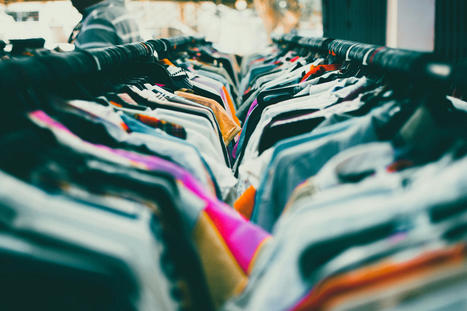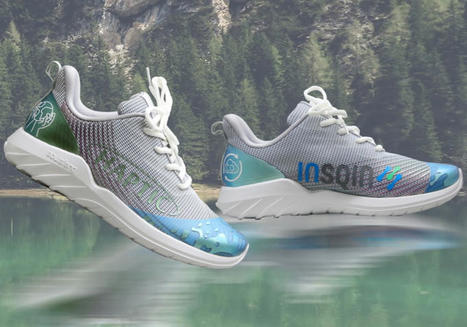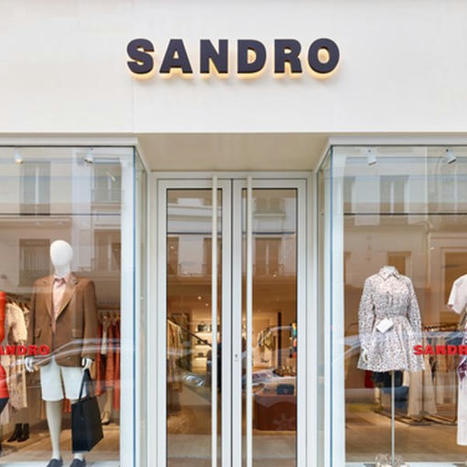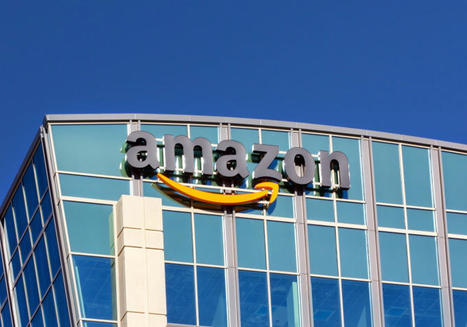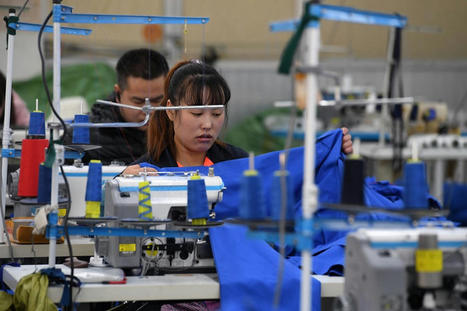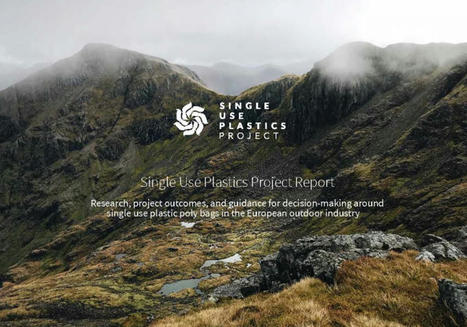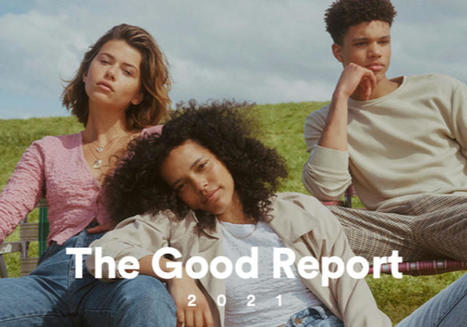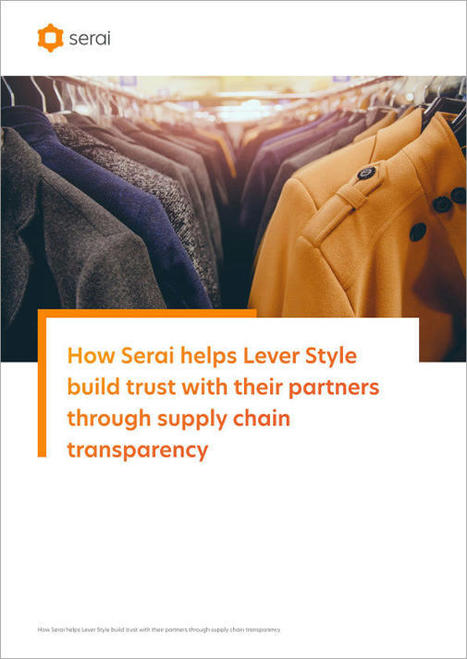 Your new post is loading...

|
Scooped by
EcoVadis
September 5, 2022 2:48 AM
|
Generation Z members say they want their clothes to be sustainable but still regularly buy fast fashion, demonstrating a "clear gap" between ideals and practice, new research shows.
Nine in ten who were surveyed bought fast fashion and only one in six could name a brand that made sustainable clothing, the British Academy of Management annual conference at the Alliance Manchester Business School heard today.
Women were more likely than men to advocate for sustainable clothing, but less likely than them to actually buy it, the survey found.

|
Scooped by
EcoVadis
May 25, 2022 4:58 AM
|
JD Williams today launches a new sustainable clothing brand as part of its commitment to responsible sourcing.
JD Williams, part of home shopping business N Brown Group, says its new Anise women’s clothing collection is designed to enable its customers to buy more sustainable garments. N Brown Group has a commitment to ensuring all of its own-brand products are responsibly sourced by 2030. So far, it says 30% of those products have sustainable properties, and by 2022 it aims to source 50% of cotton from more sustainable sources, such as recycled, organic or from the Better Cotton initiative.

|
Scooped by
EcoVadis
March 17, 2022 2:59 AM
|
Only a third of companies have credible carbon emission reduction plans in place - with apparel among the worst offenders, according to the CDP intitiative.
The non-profit, which runs the world's environmental disclosure system, said more than 13,100 companies disclosed their plans to mitigate climate change last year.
However, only 4,002 had developed a low-carbon transition plan and just 135 - fewer than one per cent - reported on all 24 of the CDP's key indicators of a credible plan.

|
Scooped by
EcoVadis
March 16, 2022 2:56 AM
|
German polymer materials manufacturer Covestro and Chinese companies Huafeng and Cyclone say they have jointly developed a 'more sustainable' way of producing high-quality running and sports shoes.
It makes use of Covestro's Insqin waterborne polyurethane (PU), textile technology company Huafeng's Haptic 3D textile printing system and recycled PET fibers from Cyclone to signficantly reduce carbon emissions.
Cyclone's recycled polyester yarns are used for the shoe uppers and coated using Huafeng's 3D Haptic textile printing process and Covestro's partially bio-based Impranil eco DLS polyurethane (PU) dispersion as a binder.

|
Scooped by
EcoVadis
March 16, 2022 2:53 AM
|
The Dutch Agreement on Sustainable Garments and Textile (AGT) has published a guide to help companies prepare for forthcoming mandatory due diligence legislation proposed by the European Union.
AGT, which expired at the end of last year, said the document would help companies identify, prevent and mitigate potential environmental and human rights risks in their supply chain.
The 'Practical guide for companies on IRBC and OECD due diligence' formed the basis of AGT's annual assessment of the fashion brands and retailers among its members.

|
Scooped by
EcoVadis
March 8, 2022 2:30 AM
|
SMCP has announced a link-up with French start-up Fairly Made, making it “one of the first accessible luxury brands to offer its customers detailed and transparent information on the traceability of its products”.

|
Scooped by
EcoVadis
March 7, 2022 2:23 AM
|
Online retail giant Amazon has launched a new brand - Amazon Aware - to help its customers more easily shop for 'more sustainable' products including men's and women's apparel.
Amazon says that products carrying the Aware label will be certified as carbon neutral and made from materials such as recycled polyester and organic cotton.
The retailer says Amazon Aware will focus on everyday essentials which will carry the appropriate third party certifications which feature in its Climate Pledge Friendly programme.

|
Scooped by
EcoVadis
March 6, 2022 1:37 AM
|
Fashion brand Hugo Boss has invested US$5 million in Swiss textile innovator HeiQ’s new class of cellulosic bio-polymer-based filament that’s made from ‘low grade’ inputs and claims to help mitigate the climate impacts of the textile sector.
This latest investment will be used to commission a pilot plant, currently being built in Austria, which HeiQ says will have an annual production capacity of 100 tons of the new filament yarn by the middle of this year.
Billed as ‘AeoniQ’, the new yarn is in the process of being filed as a new classification of cellulose fibres derived from multiple sources of textile waste such as recycled textiles, algae and bacterial cellulose, as well as conventional wood pulp.

|
Scooped by
EcoVadis
March 4, 2022 2:44 AM
|
Sustainability- a buzzword thrown around by fashion insiders, but what exactly does it mean? Sustainability, in simple terms, means to sustain something over a long period of time. As a policy, sustainability concerns itself with economic, social, and environmental betterment. When narrowed into fashion, sustainability means taking socio-economic and environmental-friendly approaches to the production, distribution, and consumption of fashion products.
Environmental Issues
The fashion industry, if charged on all counts of contributing to water waste, carbon emission, wildlife endangerment, and oceanic microplastic pollution would be found guilty. According to the BBC, the global fashion industry contributes ten percent of global carbon emissions and twenty per cent of water waste. The World Economic Forum (WEF) reported the fashion industry as the second largest water consumer. Thirty-five percent of oceanic microplastic pollution came from the fashion industry according to International Union for Conservation of Nature.

|
Scooped by
EcoVadis
February 28, 2022 1:27 AM
|
Technology company Higg and the Apparel Impact Institute (Aii) have developed a new carbon management programme in a bid to accelerate fashion brands’ environmental ambitions.
The Carbon Leadership Programme, led by Aii’s strategic partner Reset Carbon, aims to pinpoint supply chain improvements within factories, enabling companies to introduce targeted solutions.
“We’re committed to providing businesses actionable data and insights on their carbon impact so they can evaluate emissions and make strategic decisions and changes to improve performance,” said Jason Kibbey, CEO, Higg, “Offering this carbon assessment on Higg’s platform allows brands access to even more data in one place, delivering a comprehensive view of their environmental impact.”

|
Scooped by
EcoVadis
February 16, 2022 3:28 AM
|
The Sustainable Apparel Coalition (SAC), a nonprofit alliance promoting sustainable practices for the consumer goods industry, has entered into a partnership with the Initiative for Global Solidarity (IGS) to coordinate a project advancing environmental, social and labor assessment methodologies in the garment and footwear sector. The initiative is being launched in collaboration with the Apparel…

|
Scooped by
EcoVadis
February 12, 2022 2:48 AM
|
Adidas has introduced a new hiking and athletic shoe in its TERREX line of apparel. The Nothing Left Behind Free Hiker Gore-Tex shoe is an ankle-supporting athletic shoe in sophisticated colors for the sustainably-minded hiker. It’s the latest in a growing movement for sustainable footwear.

|
Scooped by
EcoVadis
January 29, 2022 2:24 AM
|
Gildan Activewear has unveiled new environmental and social sustainability targets, with the firm keen to reduce its carbon emissions, boost its use of ‘preferred fibres’, and better support workers and their communities by 2030.
The company’s strategy comprises five pillars: climate, energy and water; circularity; human capital management; long-term value creation; and transparency and disclosure.
“This next generation strategy will push us to deliver even stronger ESG performance and continue to reinforce Gildan as a leading ethical, sustainable, and efficient apparel company,” said Glenn Chamandy, the business’ president and CEO.
|

|
Scooped by
EcoVadis
September 5, 2022 2:43 AM
|
Pollution, high carbon footprints and overproduction in the apparel and retail industry are going out of fashion for allocators scrutinising companies’ environmental and social impact.
Data from the World Bank shows that the fashion industry is responsible for about 10% of annual global carbon emissions - more than international flights and maritime shipping combined. Beyond CO2, consumers and investors are also dissecting the sector's fast pace of production, labour practices, pollution and biodiversity impact. To achieve a more sustainable world, the industry must become more sustainable. However, it is imperative that the industry examines what it means to be ‘sustainable'. Sustainable fashion definition To define sustainable fashion, investors must look at eve...

|
Scooped by
EcoVadis
March 17, 2022 3:00 AM
|
The European Outdoor Group (EOG) industry association has unveiled new proposals aimed at addressing the issue of single use plastics in the outdoor apparel value chain.
A new report from EOG's Single Use Plastics Project (SUPP) recommends a system for recycling more plastic bags before they end up in incinerators, landfill or are sent for export.
EOG said the initial plan had been to find a plastic-free alternative material to protect garments and other outdoor equipment en route from manufacturers in Asia to brands in Europe but this had not proved the best option.

|
Scooped by
EcoVadis
March 16, 2022 2:57 AM
|
Australian retail chain Cotton On has pledged to strengthen its commitment to sustainability by setting goals for carbon neutrality, sourcing more sustainable raw materials and reducing its use of water and virgin plastic.
In its first 'The Good Report', the company details the steps it is taking to reduce its environmental impact which include a pledge to be carbon neutral and use 100 per cent renewable energy in its own operations by the end of the decade.
The Cotton On Group is also committing to using only raw materials which have sustainable attributes by 2030, and that all of its polyester and other synthetic materials will be 100 per cent recycled by 2025.

|
Scooped by
EcoVadis
March 16, 2022 2:55 AM
|
French sporting goods retailer Decathlon and German development agency GIZ have joined forces in a bid to reduce the environmental impact of Vietnam's garment and textile factories.
The partnership will focus on helping Decathlon's Vietnamese suppliers to switch from coal-fired energy to biomass, while offering free training on issues such as climate change and chemical management.
Part of the driving force is the German Due Diligence Act, due to come into force in 2023, and the European Union's proposed mandatory due dilience legislation which will make companies liable for environmental and human rights risks in their global supply chains.

|
Scooped by
EcoVadis
March 9, 2022 2:32 AM
|
Marks & Spencer has unveiled its first capsule collection as part of The Jeans Redesign, with the range responsibly sourced to meet the project’s guidelines and co-developed with over 80 denim experts.
The five-piece capsule collection has been designed to be fit for a circular economy, made to be used more, made to be made again, and made from safe and recycled or renewable materials.
The styles have maximised the use of easily recycled and renewable materials and are made with organic cotton, including a minimum of 25% recycled cotton.

|
Scooped by
EcoVadis
March 8, 2022 2:29 AM
|
American Eagle Outfitters and multinational retailer C&A are among the first to trial a new carbon impact reduction program. Higg, the tech spin-off from the Sustainable Apparel Coalition, and the Apparel Impact Institute (Aii) recently revealed its “Carbon Leadership Program” and tech assessment.

|
Scooped by
EcoVadis
March 6, 2022 2:33 AM
|
When fashion apparel is made, consumers do not understand the amount of waste that is created in making those products. Kate Dillion, founder and creative director at Australian fashion brand She Lion works to make sure every part of their supply chain is sustainable.
“Making garments and accessories does greatly impact the environment and a lot of people aren't aware about how that happens. A huge part of it is some consumer awareness, and understanding and insight about the impact that the creation of these things makes,” she said.
“I had no idea that there was that much water used when you make jeans. It was a huge upskilling experience to me and something that's completely made me rethink how I run my business and to ask a whole lot more questions.”
She has had specialist third parties come in and assess their supply chain ensuring everyone that she works with is ethically certified.

|
Scooped by
EcoVadis
March 5, 2022 1:36 AM
|
New Zealand-American footwear brand Allbirds has partnered with circular solutions provider Trove to launch a new resale platform for footwear, called ReRun.
With Trove managing the service’s logistics, Allbirds will encourage shoppers to return unwanted items in exchange for US$20 in store credit.
“By launching our trade-in programme, we will enable our customers to play an integral role in extending the life of our shoes. We always seek partners who share our commitment to sustainability, and we’re thrilled to work with Trove on our first recommerce initiative,” commented Allbirds’ head of sustainability, Hana Kajimura.

|
Scooped by
EcoVadis
March 4, 2022 1:30 AM
|
OECD deputy secretary general Yoshiki Takeuchi has spelt out how the fashion industry can bounce back from the COVID-19 pandemic in a way that protects the environment and vulnerable supply chain workers.
Takeuchi highlighted three trends which he sees as key to a sustainable recovery in his opening speech to the OECD Forum on Due Diligence in the Garment and Footwear Sector online event which runs until Friday 25th February.
Firstly, he pointed to new and proposed mandatory due diligence laws by a number of countries and regions - including the European Union - which will make companies responsible for human rights and environmental issues in their global supply chains.

|
Scooped by
EcoVadis
February 23, 2022 1:56 AM
|
Just days after announcing it was revolutionizing its packaging supply chain to protect the world’s forests, Mango also debuted a sustainable denim collection and a list of targets it plans to meet by 2050. By 2025, it will make sure all of its polyester is recycled, and all cellulose fibers are traceable. Also by 2025, all cotton used will be sourced from sustainable origins. By 2030, it will reduce its direct emissions, as well as those generated by the Scope 1 and 2 energy it consumes, by 80 percent. It will also reduce its Scope 3 emissions it produces in its supply chain by 35 percent the same year. By 2050, it aims to be net zero.

|
Scooped by
EcoVadis
February 15, 2022 3:26 AM
|
It is admirable that the apparel industry is gradually increasing its level of investment towards sustainable fibers such as organic cotton. Not only is organic cotton more beneficial for the end wearer (i.e. better for ‘next to skin’ contact), but it’s healthier for our planet’s soil, water and air—present and future. There’s only one problem: There’s not enough organic cotton to go around.
As if aligning supply and demand in the apparel industry wasn’t challenging enough, the growing interest in organic cotton textiles has made procuring organic cotton increasingly challenging and competitive.
“Cotton is the most widely used fiber in the world, and only the smallest fraction (less than 1 percent of world cotton production, according to World Textile Exchange) is grown fully organic,” said Mou Nath, CMO and sustainability strategist at ZXY International. “Demand for organic cotton has increased dramatically in recent years to the point that, without a plan to convert more conventional acreage to organic acreage, brands may not be able to secure a future supply.”

|
Scooped by
EcoVadis
February 1, 2022 3:25 AM
|
Lever Style is a global company that offers a range of services for apparel design, development and manufacturing to some of the world’s largest apparel brands such as Stitch Fix, Rag & Bone, Paul Smith, Hugo Boss, Theory, Fila and many more.
With such diverse international clientele, quality and sustainability of their products were key priorities. Moreover, with more brands needing to prove the origins of their products, Lever Style wanted to stay ahead of the curve and provide this transparency to the brands they supply to.
However, with over 70 manufacturing and supplier relationships across Asia, this wasn’t an easy or straightforward task. Lever Style were also manually managing their partner data through various ERP, PLM systems and Microsoft Excel which was time-consuming and difficult to consolidate information across various departments.
Download this case study to learn how Serai’s Traceability and Visibility solutions helped digitise Lever Style’s vast amount of supply chain data, and empowered them with the insights to know what exactly is happening at every stage of their supply chain.
|
 Your new post is loading...
Your new post is loading...





